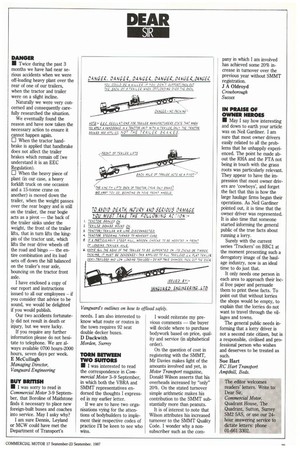DANGER
Page 41

If you've noticed an error in this article please click here to report it so we can fix it.
• Twice during the past 3 months we have had near serious accidents when we were off-loading heavy plant over the rear of one of our trailers, when the tractor and trailer were on a slight incline.
Naturally we were very concerned and consequently carefully researched the situation.
We eventually found the reason and have now taken the necessary action to ensure it cannot happen again.
LI When the tractor handbrake is applied that handbrake does not affect the trailer brakes which remain off (we understand it is an EEC Regulation),
El When the heavy piece of plant (in our case, a heavy forklift truck on one occasion and a 15-tonne crane on another) is moved down the trailer, when the weight passes over the rear bogey and is still on the trailer, the rear bogie acts as a pivot — the back of the trailer sinks under the weight, the front of the trailer lifts, that in turn lifts the kingpin of the tractor unit, which lifts the rear drive wheels off the road and bingo — the entire combination and its load sets off down the hill balanced on the trailer's rear axle, bouncing on the tractor front axle.
I have enclosed a copy of our report and instructions issued to all our employees – if you consider that advice to be sound, we would be delighted if you would publish.
Our two accidents fortunately did not result in death or injury, but we were lucky.
If you require any further information please do not hesitate to telephone. We are always available 0700 hours-2000 hours, seven days per week. E McCullagh Managing Director, Vanguard Engineering
BUY BRITISH
• I was sorry to read in Commercial Motor 3-9 September, that Boroline of Maidstone finds it necessary to place new foreign-built buses and coaches into service. May I asky why?
I am sure Dennis, Leyland or MCW could have met the Department of Transport's needs. I am also interested to know what route or routes in the town requires 92 seat double decker buses.
D Dackwith Morden, Surrey
TORN BETWEEN TWO SUITORS in I was interested to read the correspondence in Commercial Motor 3-9 September, in which both the VBRA and SMMT representatives endorsed the thoughts I expressed in my earlier letter.
If we are to have two organisations vying for the attentions of bodybuilders to implement their respective codes of practice I'll be keen to see who wins. I would reiterate my previous comments — the buyer will decide where to purchase bodywork based on price, quality and service (in alphabetical order).
On the question of cost in registering with the SMMT, Mr Davies makes light of the amounts involved and yet, in Motor Transport magazine, Donald Wilson asserts that his overheads increased by "only" 20%. On the stated turnover simple arithmetic makes his contribution to the SMMT substantially more than peanuts.
It is of interest to note that Wilson attributes his increased turnover to the SMMT Quality Code. I wonder why a nonsubscriber such as the corn pony in which I am involved has achieved some 20% increase in turnover over the previous year without SMMT registration.
J A Oldroyd Crowborough Sussex
IN PRAISE Of OWNER HEROES
• May I say how interesting and down to earth your article was on Neil Gardiner. I am sure that most owner drivers easily related to all the problems that he unhappily experienced. The point he made about the RHA and the FTA not being in touch with the grass roots was particularly relevant. They appear to have the impression that most owner drivers are 'cowboys', and forget the fact that this is how the large haulage firms began their operations. As Neil Gardiner pointed out, it is time that the owner driver was represented. It is also time that someone started informing the general public of the true facts about running a lorry.
Surely with the current series 'Truckers' on BBC1 at the moment presenting such a derogatory image of the haulage industry, now is an ideal time to do just that.
It only needs one person in each area to approach their local free paper and persuade them to print these facts. To point out that without lorries the shops would be empty, to explain that the lorries do not want to travel through the villages and towns.
The general public needs informing that a lorry driver is not a second rate citizen, but is a responsible, civilised and professional person who wishes and deserves to be treated as such.
Sue Hart RC Hart Transport Ampthill, Beds.




































































































